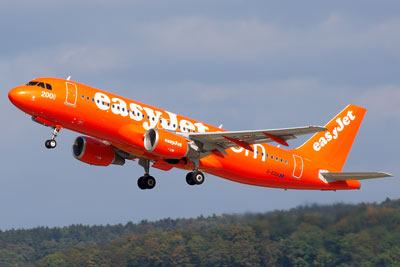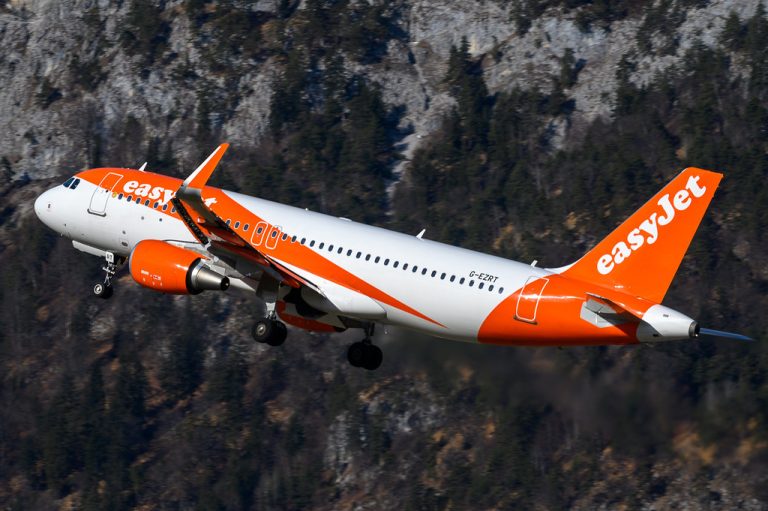easyJet plc (LON:EZJ) today announced results for the six months ending 31 March 2019.
Summary
· During the first six months of Financial Year 2019 easyJet has:
o delivered first half results in line with expectations
o brought additional focus on its cost, customer and operational initiatives to underpin the outlook for the remainder of the year
o continued to invest in the strategy set out in the Our Plan framework and is making good progress on its strategic initiatives
· Passenger numbers for the six months to 31 March 2019 increased by 4.9 million (13.3%) to 41.6 million
· Capacity1 increased by 14.5% principally due to annualising of new operations in Berlin. easyJet grew its existing network capacity by c.7%. Load factor decreased by 1.0 percentage points to 90.1% mainly as a result of building loads in Berlin in the first quarter
· Total revenue increased by 7.3% to £2,343 million (H1 2018: £2,183 million) due to capacity growth and a foreign exchange benefit negatively offset by, the impact of the move of Easter, the new IFRS 15 accounting standard and the annualisation of prior year benefits such as Monarch’s bankruptcy and Ryanair cancelling a large proportion of its winter 2017/8 schedule in the UK. Total revenue per seat decreased by 6.3% to £50.71 (H1 2018: £54.10), with a decrease of 7.4% at constant currency2
· Headline cost per seat increased by 3.9% to £56.66 (H1 2018: £54.53) as a result of fuel price increases, the impact of foreign exchange, underlying cost inflation, investing in resilience as well as the impact of drones at Gatwick in December, mitigated by easyJet’s cost programme and fleet up-gauging. Headline cost per seat excluding fuel at constant currency increased by 1.3%
· Headline loss before tax was £275 million (H1 2018: loss of £18 million) reflecting the above revenue and cost drivers, easyJet’s normal seasonality as well as increased volume of capacity
· Total loss before tax of £272 million for the six months ended 31 March 2019 (H1 2018: loss of £68 million) reflecting a small benefit of £3 million from non-headline items
· easyJet’s business model and strategy are underpinned by sector leading balance sheet strength, with a net debt position at 31 March 2019 of £201 million (under new IFRS 16 accounting standards)
Outlook
· easyJet’s headline profit before tax expectations for Financial Year 2019 remain unchanged and in line with market expectations
· easyJet continues to implement its strategy to secure leading positions at primary airports to drive profitable growth, returns and cash flow
· Forward bookings for the third quarter are three percentage points behind last year at 72% and flat year on year at 34% for the fourth quarter. easyJet’s capacity growth in the second half is forecast at c.7%
· Revenue per seat at constant currency in the second half is now expected to be slightly down. This is not helped by the ongoing negative impact of Brexit-related market uncertainty as well as a wider macroeconomic slowdown in Europe. This is offsetting a continued focus of yield improving initiatives, the move of Easter into the second half, the second-half phasing benefit of IFRS 15, improvements in Berlin and more disciplined market capacity growth
· However, full year headline cost per seat excluding fuel at constant currency (assuming normal levels of disruption in H2) is now also expected to be down. This includes an expected benefit in the second half from easyJet’s investment in operational resilience to manage the impact of disruption
· It is estimated that at current exchange rates(3) and with jet fuel remaining within a $600 metric tonne to $700 metric tonne trading range, easyJet’s unit fuel(4) bill for the 12 months to 30 September 2019 is likely to increase by between £25 million and £60 million compared to the 12 months to 30 September 2018. easyJet’s total fuel cost for the year to 30 September 2019 is currently estimated to be approximately £1.4 billion
· In addition, exchange rate movements are likely to have around a £10 million positive impact on headline profit before tax compared to the 12 months to 30 September 2018
· easyJet is now targeting to consolidate its stronger positions delivered over the past few years and as a result its capacity growth in Financial Year 2020 will likely be at the lower end of its historic growth rates
| H1 2019 | H1 2018 | ChangeFavourable/(adverse) | ||
| Capacity (millions of seats) | 46.2 | 40.4 | 14.5 | % |
| Load factor (%) | 90.1 | 91.1 | (1.0) | ppts |
| Passengers (millions) | 41.6 | 36.8 | 13.3 | % |
| Total revenue (£ million) | 2,343 | 2,183 | 7.3 | % |
| Headline loss before tax (£ million) | (275) | (18) | £(257) | m |
| Total loss before tax (£ million) | (272) | (68) | £(204) | m |
| Headline basic loss per share (pence) | (56.1) | (3.3) | (52.8) | pence |
| Revenue per seat (£) | 50.71 | 54.10 | (6.3) | % |
| Constant currency revenue per seat (£) | 50.12 | 54.10 | (7.4) | % |
| Total headline cost per seat (£) | 56.66 | 54.53 | (3.9) | % |
| Headline constant currency cost per seat excluding fuel (£) | 43.65 | 43.11 | (1.3) | % |
Commenting on the results, Johan Lundgren, easyJet Chief Executive said:
“easyJet has performed in line with expectations in the first half.
“I am pleased that despite tougher trading conditions, we flew more than 41 million customers, up 13% on last year, performed well operationally with 54% fewer cancellations in the period and customer satisfaction with our crew is at an all-time high. We have also continued to make good progress on our strategic initiatives in holidays, loyalty, business and with data.
“Cost control remains a major priority for easyJet. Our focus is on efficiency and on innovation through data and we are on track to deliver more than £100m in cost savings during 2019.
“We are well-equipped to succeed in this more difficult market through a number of short term customer and trading initiatives for the summer; measures to improve our operational resilience; and by focusing on what is most important to customers – value for money, punctuality and great customer service. All this is underpinned by a market leading balance sheet.
“We have invested in the operation by doubling our standby aircraft and changed our schedules so that even though the external operating environment over the summer is not set to improve, we plan to alleviate the impact on our customers. We have rolled out Auto Bag Drop to 17 airports, which combined fly over 34 million of our customers and we are now the number one airline in Berlin and at our newly opened base in Nantes in France. In total we are now the number one airline at 27 airports across the network, up from 18 two years ago.
“Our focus on our customers continues to grow their loyalty. Our loyal customers are choosing us time and again and now account for 76% of total bookings, an increase of seven million since last year.”










































